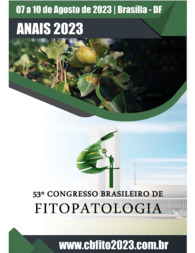Overexpression of the GmGlb1-1 and GmEXPA-1 applied in cotton to increase tolerance to Meloidogyne incognita.
Overexpression of the GmGlb1-1 and GmEXPA-1 applied in cotton to increase tolerance to Meloidogyne incognita.
Author(s): ARAÚJO, G. L. T.; BASSO, M. F.; MORGANTE, C. V.; SA, M. F. G. de
Summary: Nematodes of the genus Meloidogyne pose a challenge to worldwide agricultural production, especially to economically relevant crops, such as cotton and soybean. They induce feeding sites on plant roots, leading to reduced crop yields due to impaired water and nutrient absorption. Current control methods are insufficient for this phytopathogen management. Chemical nematicides are highly toxic, crop rotation is inefficient for population elimination, and commercially resistant or tolerant cultivars are scarce. Thus, the development of less susceptible biotechnological cultivars for efficient nematode management is required. The GmGlb1-1 gene of Glycine max encodes a protein related to nitric oxide metabolism that accumulates in roots during nematode parasitism. Studies have shown that overexpression of GmGlb1-1 enhances plant resilience to oxidative stress and improves cellular homeostasis. In addition, the GmEXPA1 gene encodes an enzyme involved in cell wall lignification processes and, when overexpressed, promotes adaptability to adverse conditions. Independent overexpression of both genes has been associated with reduced susceptibility of Arabidopsis thaliana and Nicotiana tabacum to M. incognita. However, the combined effect of such genes in increasing plant resistance to nematodes has not yet been investigated. Here, we proposed to overexpress the GmGlb1-1 and GmEXPA1 genes in cotton to confer reduced susceptibility to M. incognita. Eight independent transgenic events were generated with a 1% transformation efficiency. Characterization of transgenic plants was performed by PCR and enzyme-linked immunosorbent assays. Five independent transformation events with high transgenic protein accumulation were selected for generation advancement. Progenies of T2 generation were inoculated with 2000 ppJ2 juveniles of M. incognita at 15 days after seed germination in an assay performed in greenhouse with 20 replicates of each event. After 90 days, the roots were evaluated for the incidence of galls using a qualitative rating scale. Two transgenic events stood out by having superior scores, indicating a reduction in the number of galls. Additional analyses are in progress to determine quantitative effects of the parasitism in transgenic plants. Biotechnology approaches offer great potential for application in commercial crop cultivars aiming to reduce plant susceptibility to root-knot nematodes and develop sustainable agriculture with less dependence on pesticides.
Publication year: 2023
Types of publication: Abstract in annals or event proceedings
Unit: Embrapa Semi-arid Region
Observation
Some of Embrapa's publications are published as ePub files. To read them, use or download one of the following free software options to your computer or mobile device. Android: Google Play Books; IOS: iBooks; Windows and Linux: Calibre.
Access other publications
Access the Agricultural Research Database (BDPA) to consult Embrapa's full library collection and records.
Visit Embrapa Bookstore to purchase books and other publications sold by Embrapa.

